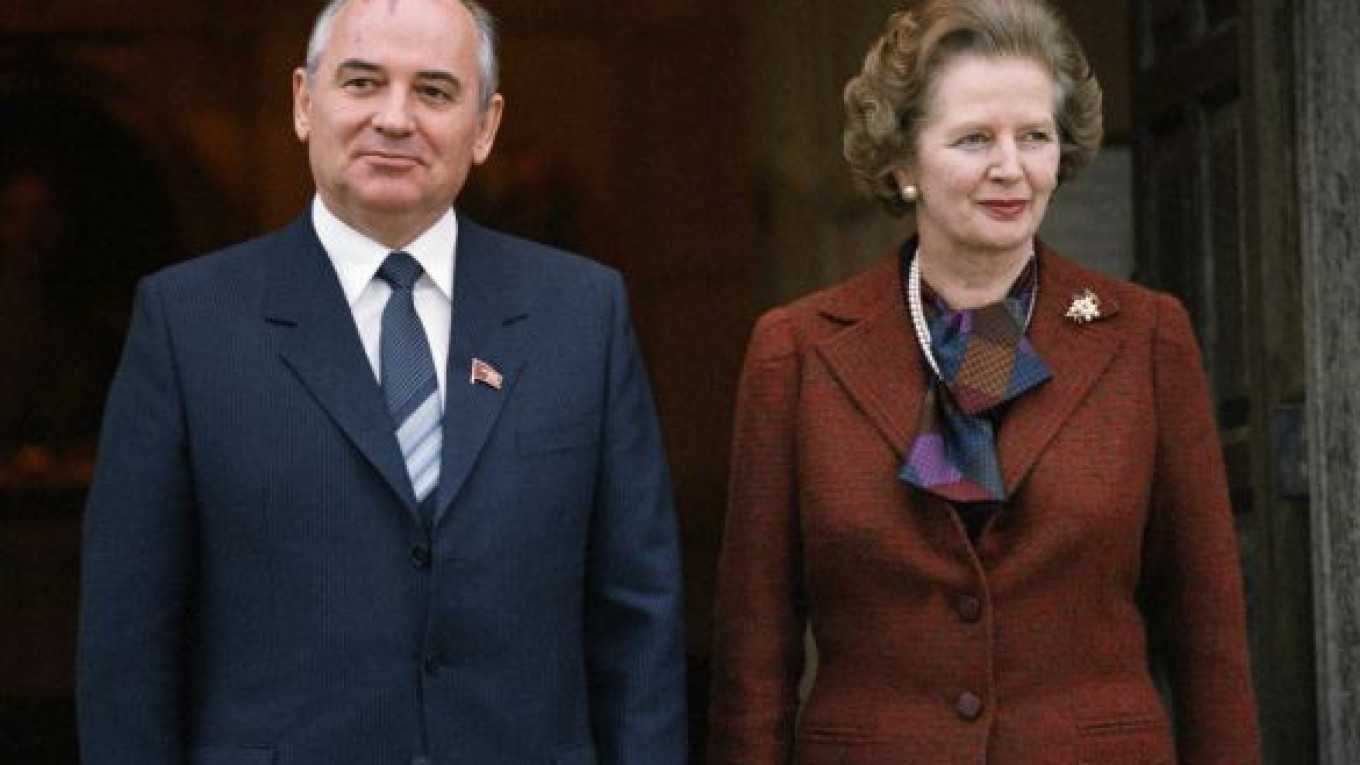Former British Prime Minister Margaret Thatcher, a defining figure in world politics who worked closely with Soviet leader Mikhail Gorbachev to end the Cold War, died Monday after suffering a stroke at London's exclusive Ritz hotel. She was 87.
Thatcher, who governed Britain between 1979 and 1990 as Conservative Party leader, will be remembered in her home country as a controversial figure for her pro-market economic reforms and for crushing militant trade unions.
On the international stage, she was a prominent ally of U.S. President Ronald Reagan and an outspoken opponent of communism, for which the Soviet Union's Defense Ministry newspaper dubbed her the "Iron Lady," a moniker that stuck.
She described Gorbachev as a man with whom she could "do business" and publicly backed perestroika during a 1990 visit to Moscow.
Thatcher, Britain's first and only female prime minister, had been in poor health for several years and rarely appeared in public. Responding to her death, world leaders and former associates described her as one of the greatest leaders of her age.
"Thatcher did a great deal to change people's attitudes to our country, and reacted positively both to Gorbachev as a person and to his policies," Pavel Palazhchenko, Gorbachev's English-language interpreter, told The Moscow Times.
"Without doubt, she played an instrumental role in ending the Cold War," said Palazhchenko, who added that she was well-respected by top Soviet officials and got along well with Gorbachev's wife, Raisa.
Vyacheslav Nikonov, a State Duma deputy with the ruling United Russia party and a political scientist, described Thatcher as a "highly successful politician" who had a great influence on Gorbachev and "moved Britain forward."
"Her books will remain essential reading for those who want to work in politics for many generations to come," Nikonov said by phone, recalling that he last met Thatcher at London's Covent Garden opera house in 2009.
Gorbachev wrote on the website of his Gorbachev Foundation that he remembered Thatcher as a politician "whose word carried weight" and that their close relationship was rooted in their 1984 meeting in London, before Gorbachev rose to the summit of the Communist Party leadership.
"We were able to come to a mutual understanding, and this was our contribution to changing the atmosphere between the Soviet Union and the West," he said.
Apart from her 1990 visit, Thatcher gave an interview to three Soviet journalists in 1987 in one of the first instances that a Western leader was able to address a Soviet television audience directly.
Putting political differences aside, world leaders on Monday paid tribute to Thatcher as an iconic stateswoman and steely leader.
"Margaret Thatcher succeeded against all the odds. She didn't just lead our country, she saved our country," British Prime Minister David Cameron, the current Conservative Party leader, told the BBC.
German Chancellor Angela Merkel said she would never forget Thatcher's contribution in supporting the reunification of Germany, and U.S. President Barack Obama said his country had lost "a true friend."
President Vladimir Putin said at a news conference in the Netherlands that Thatcher was "pragmatic, harsh and consistent," noting that her approach helped Britain recover economically.
British authorities said Thatcher would have a ceremonial funeral with full military honors at London's St. Paul's Cathedral. A state funeral will not be held, in accordance with her family's wishes.
Contact the author at a.winning@imedia.ru
A Message from The Moscow Times:
Dear readers,
We are facing unprecedented challenges. Russia's Prosecutor General's Office has designated The Moscow Times as an "undesirable" organization, criminalizing our work and putting our staff at risk of prosecution. This follows our earlier unjust labeling as a "foreign agent."
These actions are direct attempts to silence independent journalism in Russia. The authorities claim our work "discredits the decisions of the Russian leadership." We see things differently: we strive to provide accurate, unbiased reporting on Russia.
We, the journalists of The Moscow Times, refuse to be silenced. But to continue our work, we need your help.
Your support, no matter how small, makes a world of difference. If you can, please support us monthly starting from just $2. It's quick to set up, and every contribution makes a significant impact.
By supporting The Moscow Times, you're defending open, independent journalism in the face of repression. Thank you for standing with us.
Remind me later.






